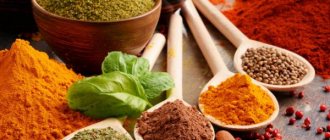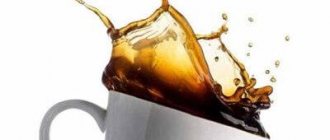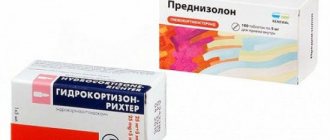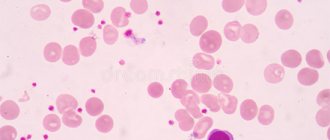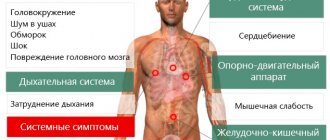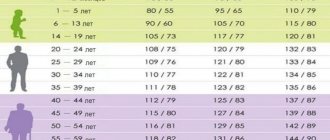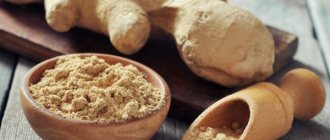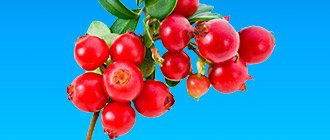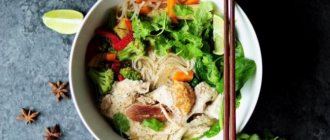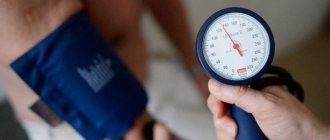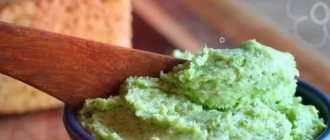Blood pressure is one of the most important indicators of health, depending mainly on vascular tone and the volume of circulating blood. Everyone knows about the dangers of high blood pressure. What do doctors say about low?
The normal blood pressure level at any age is less than 140/90 mmHg. Art. Increased blood pressure above 140/90 mm Hg. Art. called arterial hypertension, or hypertension. This condition is dangerous due to the development of strokes, heart attacks and other cardiovascular complications; it requires treatment and medical supervision even if you do not feel it. What can we say about low blood pressure?
Natalya Polenova—candidate of medical sciences, family doctor, cardiologist, pediatric cardiologist, nutritionist at GMS Clinic.
Hypotension (a blood pressure drop of less than 90/60) is usually not dangerous to health. Constantly low blood pressure levels often occur in young girls of fragile constitution, but this, as a rule, does not affect the quality of life.
Persistent hypotension if you feel well does not require treatment. But, if the pressure drops sharply and this leads to fainting or causes a pre-fainting state, medical attention and additional examination may be required.
Reducing blood pressure in the following situations deserves special attention:
Orthostatic hypotension is loss of consciousness when there is a sudden change in body position from horizontal to vertical, for example when suddenly rising from bed. Because of this, the volume of circulating blood is redistributed and the blood supply to the brain is temporarily reduced. This condition often occurs in pregnant women due to changes in the circulatory system and a shift in the center of gravity. Therefore, during pregnancy, it is important to avoid sudden movements and carefully get out of the car or get up from a chair.
Taking medications to lower blood pressure. The goal of antihypertensive therapy is to achieve a sustained reduction in blood pressure below 140/90 mmHg. Art., but without episodes of sharp decline. An inappropriate dosage of the drug can cause hypotension - this leads to weakness, fatigue during physical activity and dizziness. In this case, it is necessary to conduct daily monitoring of blood pressure and adjust therapy.
Fainting is a short-term loss of consciousness due to impaired blood supply to the brain. For complete loss of consciousness, a sudden cessation of cerebral blood flow for 6–8 seconds is sufficient.
Types of fainting:
- reflexive, due to fear, pain, heat or stuffiness;
- orthostatic, with a sharp transition to a vertical position;
- cardiogenic, for diseases of the heart or blood vessels, as well as due to heart rhythm disturbances.
After a sudden loss of consciousness, especially if it is a repeated occurrence, you should seek medical help. You may need to consult a therapist, cardiologist, or neurologist. In addition, it is important to undergo examinations: Holter monitoring, record an ECG and conduct an MRI of the brain. And also examine the level of sugar, iron and thyroid hormones.
Safe and effective medications for low blood pressure (hypotension).
May 2, 2021
24720
4.5
1
Content
- How to choose medications for low blood pressure?
- Caffeine
- Ekdisten
- Gutron
- Caffeamine
- Apilak
With hypotension, a person feels dizziness, malaise and deterioration in general well-being. Low blood pressure is a condition when blood pressure numbers fall below normal values.
We speak of low blood pressure when its value is about 90/60. Some people feel great with this pressure (no treatment is required), while others experience unpleasant symptoms. If you feel unwell with hypotension, be sure to consult a doctor to determine the cause of this condition and get the right treatment.
How do foods affect blood pressure?
Blood pressure is affected by both the composition of a person's diet and their eating habits, including how often they eat, how large their portions are, and how much fluid they drink. A healthy, balanced diet is one of the conditions for maintaining a healthy cardiovascular system, normal heart function and optimal blood counts. All this is directly related to blood pressure values.
What foods increase blood pressure?
There are a number of food products that increase the tone of the walls of blood vessels, the volume of fluid (and blood pumped), and also compensate for the deficiency of vitamins associated with hypotension.
Blood pressure increases when you eat the following foods:
- Salt, additives, seasonings containing sodium: retain fluid, increasing its volume in the body, increasing the volume of blood pumped. Salt intake should not be too high even with hypotension. WHO recommends consuming no more than 5 g of salt daily (1 teaspoon).
- Products containing caffeine: coffee, green tea, cocoa, strong sweet tea tone up and increase heart rate.
- High-calorie dishes. Baked goods, meat products, cheese, sweets, and high-fat dairy products provoke an increase in blood sugar, which causes blood pressure to rise. It is important for people with hypotension to eat foods that are nutritious enough, but they need to be careful that they are not excessively high in calories or contain too many carbohydrates or saturated fats.
- Products containing vitamins C, B12, E. With a deficiency of these vitamins, anemia develops, which is associated with the appearance of hypotension. By normalizing their consumption, you can reduce its manifestations. Citrus fruits, parsley, and red bell peppers contain a lot of vitamin C. Vitamin B12 is found in eggs, meat, and dairy products. Vegetable oil, avocados, and nuts contain a lot of vitamin E.
Important! Some foods prohibited for hypertensive patients can increase blood pressure: fatty, fried, too spicy foods, but using them to cope with hypotension is not recommended. Such food increases cholesterol levels in the blood, has a bad effect on the digestive system, and can cause additional health problems.
Foods that sharply increase blood pressure
Hypotension can make a person feel unwell, and it is important to know what to eat to raise blood pressure quickly. The following will help you feel better:
- black coffee;
- strong black tea;
- bitter chocolate;
- salty foods (this could be salted cheese, pickled vegetables, salted fish);
- prunes, dried apricots or other dried fruits;
- pomegranate juice;
- honey.
These products should only be used if it is known for sure that poor health is caused by hypotension. You can verify this by measuring your blood pressure. If symptoms associated with hypotension appear frequently, you should consult a doctor (general practitioner or cardiologist) and follow his recommendations.
Coffee and chocolate contribute to a rapid increase in blood pressure. Photo: nanka-photo / Depositphotos
What foods increase blood pressure during pregnancy?
In the first half of pregnancy, against the background of hormonal changes, blood pressure may decrease due to a decrease in the tone of the walls of blood vessels. This is normal, but if you experience symptoms associated with hypotension, you should inform your doctor. Blood pressure levels should return to normal after childbirth. If it becomes low during pregnancy, you need to make sure that this is not caused by anemia (for this, a blood test is taken).
To increase blood pressure during pregnancy, only certain foods can be used: chocolate, tea, pomegranate juice. Even they are not advisable to consume in large quantities so that the pressure does not become too high. This can be dangerous. It is also undesirable to increase the consumption of water or coffee (this may create additional stress on the kidneys), spicy, fatty, salty or too high-calorie foods. It is better to consult with your doctor and get nutritional recommendations from him, taking into account your general health, the duration of your pregnancy, and the characteristics of its course.
During pregnancy, you should be more careful when choosing your diet. Photo: Amina Filkins: Pexels
What foods should you not eat if you have high blood pressure?
Some foods can not only normalize blood pressure, but also increase it excessively. Eating these foods may be dangerous if a person already has hypertension. In this case, follow a special diet, excluding or limiting the consumption of the following foods:
- salt, seasonings, food additives containing sodium;
- strong tea, coffee containing caffeine;
- fatty, fried, spicy foods;
- pickles and canned foods;
- smoked meats;
- baked goods, sweets;
- fast food;
- sweet carbonated drinks;
- ready-made sauces, seasonings, flavor enhancers, and other additives that may contain sodium;
- frozen semi-finished products: pizza, dumplings and other similar dishes (may contain a lot of sugar, sodium, saturated fat to preserve taste);
- alcohol.
To prevent excessive stress on the heart and the appearance of essential hypertension, you need to adhere to a healthy, balanced diet in the same way as when preventing hypotension. Both hypertensive and hypotensive patients are equally benefited from fresh vegetables, nuts, herbs, fruits, whole grains, lean meat, poultry and fish. If your blood pressure is high, you need to eat more foods containing potassium, magnesium, and calcium. Bananas, beans, spinach, and sunflower seeds are especially useful.
How to choose medications for low blood pressure?
Medicines for hypotension are rarely prescribed. Usually, to improve the condition, it is enough to change your lifestyle: adjust your daily routine, eat right, drink more fluids and increase the amount of salt.
If drug support for low blood pressure is needed, drugs that increase the volume of blood circulating in the body or drugs that spasm peripheral arteries are prescribed. This helps increase blood pressure because blood will flow through narrower vessels under greater pressure.
All medications for low blood pressure are prescribed only by a doctor, having previously ruled out pathological causes of low blood pressure. Usually, drugs of synthetic or plant origin are used - tonics and vasoconstrictors.
Here are the safest and most effective pills for low blood pressure.
Lifestyle and daily routine
Good health is determined not only by nutrition, but also by lifestyle. Six recommendations from our expert, fitness trainer Nika Tyutyunnikova will help you forget about low blood pressure for a long time.
- Get enough sleep! The duration of night sleep should be at least eight hours. Decide what time you should go to bed in the evening and stick to it. Before going to bed, elevate your legs above your head (place them on a bolster, pillow or ball). And lie there for 10-15 minutes to ensure a rush of blood to the brain.
- Take a walk in the fresh air. Working in an office and lack of walking does not allow the blood to become saturated with oxygen. Ventilate the room regularly, open the windows slightly to allow fresh air to enter. Every evening, take non-tiring walks for 30-45 minutes.
- Take a contrast shower . It will help you quickly tone your body in the morning before work or cheer you up in the evening. Temperature changes should not be sudden. Alternate cool water with warm water.
- Drink water . The more fluid in the body, the lower the risk of loss of strength. Don't forget to drink up to one and a half liters of clean, still water throughout the day.
- Play sports . Find a type of physical activity that you enjoy and do it three to four times a week. Running, swimming, working out in the gym or Pilates at home - any type of physical exercise will be beneficial and will help blood vessels maintain tone.
- Experiment when preparing dishes . Russian cuisine uses “mild” spices, so take a closer look at Asian cuisine. There should be spicy and slightly spicy dishes on your table. Try adding curry, turmeric, chili pepper, and cardamom to roasts, fish and vegetable dishes. Drink coffee with cinnamon. New flavors will make familiar dishes interesting, tempting and invigorating. Plus, spices have a “fat-burning” effect: they increase metabolism and help fight fat deposits.
Do not intentionally over-salt your food; add salt to taste. Excessive salt consumption is dangerous.
Caffeine
This drug is sold both in tablets and in a solution for subcutaneous administration. Caffeine is a natural nervous system stimulant that stimulates the nervous system, increases vascular tone, improves blood circulation and increases blood pressure. “Caffeine” is prescribed for moderate hypotension, decreased performance, general malaise, vascular headaches, and drowsiness.
Read also: Top 10 best blood thinners Blood thinners
It is believed that “Caffeine” is a safe medicine, but there are contraindications to its use: the body’s sensitivity to its components, age under 12 years, severe heart disease (cardiosclerosis, coronary artery disease, heart attack), mental disorders, hypertension, arrhythmia, insomnia, depression. It is prescribed with caution to those who suffer from glaucoma and other vision problems.
Side effects from taking Caffeine include rapid heartbeat, sweating, nausea, trembling, and dizziness. After the effects of caffeine wear off, a person may experience weakness, inhibition of the nervous system, or general malaise.
Caffeine
JSC "Tatkhimfarmpreparaty", Russia; Borisov medical plant drugs, Belarus; PrJSC Pharmaceutical Company “DARNITSA”, Ukraine; Novosibkhimpharm OJSC, Russia; JSC Dalkhimfarm, Russia; "Moskhimfarmpreparaty" named after. N. A. Semashko, Russia; PJSC Scientific and Production Center "Borshchagovsky Chemical Plant", Ukraine
A drug whose range of uses includes: Diseases accompanied by depression of the central nervous system, functions of the cardiovascular and respiratory systems (including poisoning with opioid analgesics, infectious diseases), cerebral vascular spasms, decreased mental and physical performance, drowsiness.
from 33
5.0 1 review
716
- Like
- Write a review
Signs of low blood pressure
There is no clear boundary separating normal from insufficient indicators. In the case of hypertension, it is clear: above 139/90 is already a pathology with all its negative consequences. And not everything below 120/90 is considered hypotension. For many people, constant “working” pressure is somewhat less than ideal. These are teenagers, women of asthenic build, residents of high mountain areas. If, with reduced indicators, there are no disturbances in well-being and normal work ability remains, there is nothing to worry about. Typically the range is 110-95 for the top (systolic) and 65 for the bottom (diastolic). We can talk about hypotension if indicators are regularly or constantly observed: from 95/65 and below with a simultaneous deterioration in physical condition.
Low pressure leads to a decrease in blood supply to tissues and slows down the flow of oxygen into cells. Common symptoms of decreased tone are associated specifically with hypoxia: drowsiness, confusion, dizziness, muscle weakness. Such people cannot swing for a long time after getting out of bed, get tired quickly, and are very sensitive to inclement rainy weather. The most unpleasant signs of hypotension:
- attacks of lightheadedness with nausea and headache;
- “storm” of the body during sudden movements: getting up from a lying position, squats;
- fainting;
- prolonged migraines: after hard work, stress or anxiety.
Some people experience symptoms of hypotension from time to time, while others suffer from them constantly. In severe cases, low blood pressure indicates problems with the heart, respiratory or endocrine systems. Sometimes hypotension is genetically determined. A correct lifestyle helps to reduce its manifestations to a minimum. It is special for those with low blood pressure.
Ekdisten
This is a herbal medicine that comes in the form of tablets and powder sachets. The active substance of the drug is a plant extract from the rhizomes of Leuzea safflower. "Ecdisten" improves overall metabolism, vascular tone, stimulates protein synthesis, and has a weak anabolic effect.
This drug is prescribed for low blood pressure, general asthenia, to improve performance and for weather dependence.
Contraindications include: age under 18 years, allergies to drug components, hypertension, nervous disorders with agitation, epilepsy, stomach ulcers. Ecdisten should be prescribed with caution to those with diabetes or thyroid disease. Alcohol is contraindicated while taking Ecdisten.
Ekdisten
Wifitech/Vilar, Russia
The drug Ecdisten is used in adults as a tonic: asthenodepressive syndrome (associated with a weakening of protein synthesizing processes: during prolonged intoxication, infections), neurasthenia. And also as part of combination therapy - arterial hypotension, intense training (dysfunction of the cardiovascular system, especially with pronounced signs of myocardial overstrain and increased protein catabolism), as a drug that increases speed and strength qualities during the period of preparation for competitions.
308
- Like
- Write a review
Is it possible to raise blood pressure on your own at home?
– At home, in order to raise blood pressure, you can drink tea or coffee, eat something salty, and quickly drink 1-2 glasses of cold water (with ice in large sips).
You can also use so-called physical counterpressure maneuvers: crossing your legs in combination with maximum tension in the muscles of the legs, abdomen and buttocks; maximum squeezing of the rubber ball in the hand; squeezing one hand with the other with gradual abduction of the hands (phalanxes of the fingers in a lock in front of the chest).
All this is done with effort, muscle tension for as long as possible, until the symptoms disappear completely.
Gutron
This drug for the treatment of hypotension is available in drops and tablets and is sold by prescription. The active substance of the drug is midodrine (a group of adrenergic agonists that tone blood vessels).
“Gutron” is prescribed for hypotension, orthostatic hypotension (a sharp decrease in pressure when a person takes a horizontal position), and for weather dependence. The medicine moderately constricts blood vessels, improves their tone, which increases blood pressure and removes blood stagnation in the veins.
Contraindications include: high blood pressure, overactive thyroid gland, severe kidney disease, urinary retention and prostate adenoma.
When taking Gutron, the following side effects are possible: skin rash, tachycardia, nausea. This drug should not be taken with alcohol.
Gutron
Takeda Pharmaceutical Company, Japan
Gutron is a remedy for increasing blood pressure, and is also recommended for use in patients with urinary incontinence caused by bladder dysfunction.
from 1950
5.0 1 review
784
- Like
- Write a review
Authorized Products
A diet for hypotension should provide the body with the physiological norm of proteins, fats and carbohydrates and should include foods and dishes with a moderately high salt content - various pickles, canned meat and fish, smoked meats, salted fish, fish caviar, raw smoked sausages.
It is recommended to include in the diet dishes richly flavored with herbs/spices (bay leaf, garlic, allspice, cloves, cumin, cinnamon, basil, dill, parsley, as well as various sauces (ketchup, mustard, horseradish), spicy meat, fish and vegetables broths and first courses based on them (kharcho soup, solyanka, borscht). The diet should contain dairy and fermented milk products. Fatty meats, fish, poultry, cheeses, butter, chicken eggs, foods high in starch are useful in the diet (rice, potatoes), various types of nuts, honey and bee products.
An important component of the diet are foods containing vitamins and microelements - liver, egg yolk, sprouted wheat grains, yeast, sorrel, spinach, legumes, celery.
A mandatory element of the diet of hypotensive patients should be foods and drinks containing caffeine (cocoa, chocolate, natural coffee, cola, strong green and black tea, energy drinks). As for fruits, it is recommended to include black currants, cherries, lemons, pomegranates and their freshly squeezed juices, and rosehip decoction in your diet.
Table of permitted products
| Proteins, g | Fats, g | Carbohydrates, g | Calories, kcal | |
Vegetables and greens | ||||
| canned vegetables | 1,5 | 0,2 | 5,5 | 30 |
| zucchini | 0,6 | 0,3 | 4,6 | 24 |
| cauliflower | 2,5 | 0,3 | 5,4 | 30 |
| potato | 2,0 | 0,4 | 18,1 | 80 |
| bulb onions | 1,4 | 0,0 | 10,4 | 41 |
| carrot | 1,3 | 0,1 | 6,9 | 32 |
| beet | 1,5 | 0,1 | 8,8 | 40 |
| pumpkin | 1,3 | 0,3 | 7,7 | 28 |
| horseradish | 3,2 | 0,4 | 10,5 | 56 |
| spinach | 2,9 | 0,3 | 2,0 | 22 |
| sorrel | 1,5 | 0,3 | 2,9 | 19 |
Fruits | ||||
| apricots | 0,9 | 0,1 | 10,8 | 41 |
| watermelon | 0,6 | 0,1 | 5,8 | 25 |
| bananas | 1,5 | 0,2 | 21,8 | 95 |
| melon | 0,6 | 0,3 | 7,4 | 33 |
| nectarine | 0,9 | 0,2 | 11,8 | 48 |
| peaches | 0,9 | 0,1 | 11,3 | 46 |
| apples | 0,4 | 0,4 | 9,8 | 47 |
Berries | ||||
| strawberry | 0,8 | 0,4 | 7,5 | 41 |
| raspberries | 0,8 | 0,5 | 8,3 | 46 |
Mushrooms | ||||
| marinated mushrooms | 2,2 | 0,4 | 0,0 | 20 |
Nuts and dried fruits | ||||
| nuts | 15,0 | 40,0 | 20,0 | 500 |
| raisin | 2,9 | 0,6 | 66,0 | 264 |
| dried apricots | 5,2 | 0,3 | 51,0 | 215 |
| seeds | 22,6 | 49,4 | 4,1 | 567 |
| prunes | 2,3 | 0,7 | 57,5 | 231 |
Cereals and porridges | ||||
| buckwheat (kernel) | 12,6 | 3,3 | 62,1 | 313 |
| semolina | 10,3 | 1,0 | 73,3 | 328 |
| white rice | 6,7 | 0,7 | 78,9 | 344 |
Flour and pasta | ||||
| pasta | 10,4 | 1,1 | 69,7 | 337 |
| noodles | 12,0 | 3,7 | 60,1 | 322 |
Confectionery | ||||
| jam | 0,3 | 0,2 | 63,0 | 263 |
| jelly | 2,7 | 0,0 | 17,9 | 79 |
| marshmallows | 0,8 | 0,0 | 78,5 | 304 |
| pastry cream | 0,2 | 26,0 | 16,5 | 300 |
| paste | 0,5 | 0,0 | 80,8 | 310 |
Ice cream | ||||
| ice cream | 3,7 | 6,9 | 22,1 | 189 |
Chocolate | ||||
| chocolate | 5,4 | 35,3 | 56,5 | 544 |
Raw materials and seasonings | ||||
| mustard | 5,7 | 6,4 | 22,0 | 162 |
| honey | 0,8 | 0,0 | 81,5 | 329 |
| sugar | 0,0 | 0,0 | 99,7 | 398 |
Dairy | ||||
| milk 4.5% | 3,1 | 4,5 | 4,7 | 72 |
| kefir | 3,4 | 2,0 | 4,7 | 51 |
| cream 35% (fat) | 2,5 | 35,0 | 3,0 | 337 |
| sour cream 30% | 2,4 | 30,0 | 3,1 | 294 |
| curdled milk | 2,9 | 2,5 | 4,1 | 53 |
Cheeses and cottage cheese | ||||
| parmesan cheese | 33,0 | 28,0 | 0,0 | 392 |
| cottage cheese | 17,2 | 5,0 | 1,8 | 121 |
Meat products | ||||
| boiled beef | 25,8 | 16,8 | 0,0 | 254 |
| beef liver | 17,4 | 3,1 | 0,0 | 98 |
| boiled veal | 30,7 | 0,9 | 0,0 | 131 |
| rabbit | 21,0 | 8,0 | 0,0 | 156 |
| bacon | 23,0 | 45,0 | 0,0 | 500 |
Sausages | ||||
| smoked sausage | 9,9 | 63,2 | 0,3 | 608 |
Bird | ||||
| boiled chicken | 25,2 | 7,4 | 0,0 | 170 |
| turkey | 19,2 | 0,7 | 0,0 | 84 |
| duck | 16,5 | 61,2 | 0,0 | 346 |
| smoked duck | 19,0 | 28,4 | 0,0 | 337 |
| goose | 16,1 | 33,3 | 0,0 | 364 |
Eggs | ||||
| chicken eggs | 12,7 | 10,9 | 0,7 | 157 |
Fish and seafood | ||||
| smoked fish | 26,8 | 9,9 | 0,0 | 196 |
| black caviar | 28,0 | 9,7 | 0,0 | 203 |
| salmon caviar granular | 32,0 | 15,0 | 0,0 | 263 |
| salmon | 19,8 | 6,3 | 0,0 | 142 |
| salmon | 21,6 | 6,0 | — | 140 |
| trout | 19,2 | 2,1 | — | 97 |
Oils and fats | ||||
| butter | 0,5 | 82,5 | 0,8 | 748 |
| ghee | 0,2 | 99,0 | 0,0 | 892 |
Non-alcoholic drinks | ||||
| mineral water | 0,0 | 0,0 | 0,0 | — |
| cola | 0,0 | 0,0 | 10,4 | 42 |
| black tea with milk and sugar | 0,7 | 0,8 | 8,2 | 43 |
Juices and compotes | ||||
| apricot juice | 0,9 | 0,1 | 9,0 | 38 |
| carrot juice | 1,1 | 0,1 | 6,4 | 28 |
| * data is per 100 g of product | ||||
Caffeamine
This drug for increasing low blood pressure is available in tablets and is sold by prescription. Belongs to the group of combined psychostimulants, the active substances are caffeine and ergotamine. “Caffetamine” tones the nervous system and constricts blood vessels.
This medicine is prescribed for migraines, hypotension and intracranial hypertension.
Among the contraindications: allergic reactions to the components of the drug, age under 18 years, atherosclerosis, high blood pressure, pregnancy and breastfeeding, insomnia, glaucoma, psychosis, serious heart disease, advanced age of the patient. Side effects: nausea, increased sweating, agitation, tachycardia.
Caffeamine
KRKA-RUS, Russia
The drug is used for: Vasoparalytic form of migraine;
arterial hypotension; as a means of lowering intracranial pressure in vascular, traumatic and infectious lesions of the central nervous system. from 151
5.0 1 review
517
- Like
- Write a review
Read also How to treat migraine: the best drugs Top 5 best drugs against migraine
As much air as possible
Clear, cool or frosty weather with high atmospheric pressure is the best time for hypotension. The air is maximally saturated with oxygen, so you need to walk for several hours in a row every day. Even better is to play sports outside, such as cross-country running or skiing.
In cloudy weather, it is also not recommended to sit within four walls. Stuffy indoor air is the worst environment for low pressure. It is advisable to ventilate your home and workplace as often as possible.
Apilak
This low blood pressure medicine comes in the form of sublingual tablets and ointment. "Apilak" belongs to the group of natural stimulants for the complex treatment of asthenia, neurotic disorders, and hypotension. Apilak contains a complex of biologically active substances, minerals and vitamins. The active substance is royal jelly. "Apilak" improves vascular tone, tones the nervous system and stimulates the body as a whole.
Contraindications include: allergies to bee products, age under 18 years, Addison's disease, hypertension.
